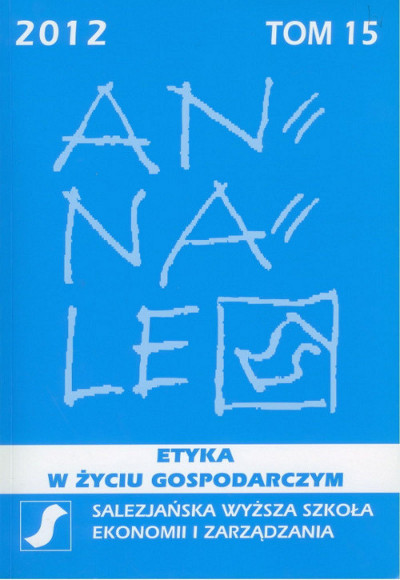Children of the Market… Market of the Children... Persons or Resources?
DOI:
https://doi.org/10.18778/1899-2226.15.07Keywords:
child, family, market, human person, resourcesAbstract
The status of the child in the context of contemporary socio-cultural processes that are reflected in the market is the main issue discussed in this paper. It may be surprising to concentrate on children and the market, while the sphere of economic exchange is the scene of such actions as work, production and consumption which seem to be reserved to adult members of the society. Although there are issues – such as kids advertisement and its consequences, and children’s participation in the process of buying – that are discussed, the range of problems that deserve consideration is far wider. The questions analyzed in this paper concentrate on two aspects. First of them is the influence of the market sphere on the life of children as members of the families and the society. The question that should be asked here is whether a child can and should be regarded as any other consumer, or should be protected – e.g. against controversial marketing practices. The second group of problems is connected with the objective way of treating children which leads to formation of something that can be called the markets of children”. Both these sets of issues are the stimulus to analyze the way of understanding a child and its status in the society. It is also done through taking into consideration such issues as current concepts of socialization, antipedagogy, infantilisation and adultisation that influence and shape market processes. Finally the analysis undertaken in this paper leads to an attempt to answer the question whether in the current context children are seen as persons or resources.
References
Ali L., R. Kelley, Matki nie swoich dzieci, „Newsweek” 2008, 20 kwietnia.
Google Scholar
Arendt H., Kondycja ludzka, Wydawnictwo Aletheia, Warszawa 2010.
Google Scholar
Bakan J., Korporacja. Patologiczna pogoń za zyskiem i władzą, tłum. J.P. Listwan, Wydawnictwo Lepszy Świat, Warszawa 2006.
Google Scholar
Barber R.B., Skonsumowani. Jak rynek psuje dzieci, infantylizuje dorosłych i połyka obywateli, Warszawskie Wydawnictwo Literackie Muza SA, Warszawa 2007.
Google Scholar
Becker G., Rodzina jako podstawowa jednostka gospodarcza, „Społeczeństwo”, nr 1–2/1997.
Google Scholar
Biernat T., Dziecko upragnioną wartością [w:] Małżeństwo i rodzina w nowoczesnym społeczeństwie, red. L. Dyczewski, Wydawnictwo KUL, Lublin 2007.
Google Scholar
Black E., Wojna przeciw słabym. Eugenika i amerykańska kampania na rzecz stworzenia rasy panów, tłum. H. Jankowska, Warszawskie Wydawnictwo Literackie MUZA SA, Warszawa 2004.
Google Scholar
Ćwik L.F., Ludzkie ciało traktują jak towar, „Nasz Dziennik” 2006, 8 maja
Google Scholar
Delsol Ch., Esej o człowieku późnej nowoczesności, tłum. M. Kowalska, Znak, Kraków 2003.
Google Scholar
Domalewska D., Socjalizacja młodzieży w rodzinie [w:] Wartości w rodzinie: ciągłość i zmiana, red. W. Muszyński, Wydawnictwo Adam Marszałek, Toruń 2010.
Google Scholar
Dueholm N., Kosmetyki śmierci, „Polonia Christiana” 2010, nr 14, maj-czerwiec.
Google Scholar
Dyczewski L., Kulturowe aspekty wartości dziecka a urodzenia [w:] Systemy wartości a procesy demograficzne, red. K. Slany, A. Małek, I. Szczepaniak-Wiecha, Zakład Wydawniczy Nomos, Kraków 2003.
Google Scholar
Dziewiecki M., Wychowanie w dobie ponowoczesności, Wydawnictwo Jedność, Kielce 2005.
Google Scholar
Fedyszak-Radziejowska B., Dokąd z in vitro?, „Gość Niedzielny” 2010, 19 grudnia.
Google Scholar
Fenigsen R., Eutanazja. Śmierć z wyboru?, W drodze, Poznań 1997.
Google Scholar
Green M.R., Superdzieci, „Wprost” 2010, nr 1/2 (1406), 3-10 stycznia.
Google Scholar
Habermas J., Przyszłość natury ludzkiej. Czy zmierzamy do eugeniki liberalnej?, Wydawnictwo Naukowe SCHOLAR, Warszawa 2003.
Google Scholar
Kasztelan E., Stan zareklamowania. Reklama wobec dziecka w środkach masowego przekazu, Wydawnictwo atla2, Wrocław 1999.
Google Scholar
Konwencja o Prawach Dziecka ONZ, 1989, art. 35.
Google Scholar
Krąpiec A.M., Człowiek i prawo naturalne, Towarzystwo Naukowe KUL, Lublin 1975.
Google Scholar
Krąpiec A.M., Człowiek jako osoba, Polskie Towarzystwo Tomasza z Akwinu, Lublin 2005.
Google Scholar
Krzyszkowska R., Komu dziecko, komu?, „Przewodnik Katolicki” 2011, nr 2, 9 stycznia.
Google Scholar
Kucharczak P., Szczep się etycznie, „Gość Niedzielny” 2010, 7 listopada.
Google Scholar
Kuhlmann A., Politik des Lebens, Politik des Sterbens, Berlin 2001.
Google Scholar
Meeker M., Ojcowie, córki i ich problemy, tłum. K. i M. Głowaccy, „Fronda” 2010, nr 56.
Google Scholar
Michalkiewicz S., Reflektorem w mrok, „W Naszej Rodzinie” 2011, luty.
Google Scholar
Miczyńska-Kowalska M., Rodzina w procesie przekazywania wartości i kształtowania stylów życia [w:] Wartości w rodzinie: ciągłość i zmiana, red. W. Muszyński, Wydawnictwo Adam Marszałek, Toruń 2010.
Google Scholar
Mosz A.T., Przyszłość na dzieciach stoi, „Przekrój” 2006, nr 05/3163, 2 lutego.
Google Scholar
Ozorowski E., Dziecko w aspekcie celu [w:] Dziecko – Etyka – Ekonomia, red. E. Ozorowski, R.Cz. Horodeński, Wydawnictwo Wyższej Szkoły Ekonomicznej w Białymstoku, Białystok 2008.
Google Scholar
Roback Morse J., Love & Economics: Why the Laissez-Faire Family Doesn’t Work, Spence Publishing Company, Dallas 2001.
Google Scholar
Samuelson J.P., Adventures in Agelessness, „Newsweek” 2003, 3 listopada.
Google Scholar
Sikora A., Dziecko-lek, czyli nowe oblicze eugeniki, „Przewodnik Katolicki” 2011, nr 8.
Google Scholar
Sikorska M., Nowa matka, nowy ojciec, nowe dziecko. O nowym układzie sił w polskich rodzinach, Wydawnictwa Akademickie i Profesjonalne, Warszawa 2009.
Google Scholar
Stasiak P., Czary marek, „Polityka” 2010, nr 23 (2759), 5 czerwca.
Google Scholar
Szacka B., Wprowadzenie do socjologii, Oficyna Naukowa, Warszawa 2008.
Google Scholar
Szyszka M., Dziecko jako wartość we współczesnym społeczeństwie polskim [w:] Wartości w rodzinie: ciągłość i zmiana, red. W. Muszyński, Wydawnictwo Adam Marszałek, Toruń 2010.
Google Scholar
Downloads
Published
How to Cite
Issue
Section
License

This work is licensed under a Creative Commons Attribution-NonCommercial-NoDerivatives 4.0 International License.









